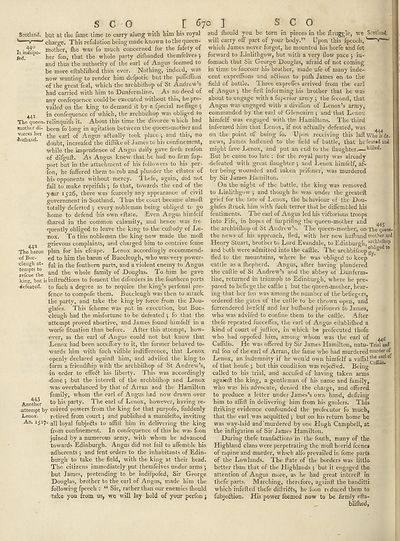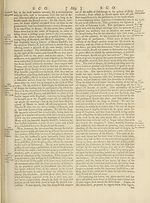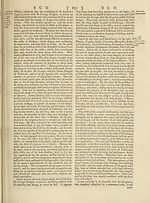Encyclopaedia Britannica, or, a Dictionary of arts, sciences, and miscellaneous literature : enlarged and improved. Illustrated with nearly six hundred engravings > Volume 18, RHI-SCR
(708) Page 670
Download files
Complete book:
Individual page:
Thumbnail gallery: Grid view | List view

S CO
r ^7° ]
SCO
Scotland, but at the Tame time to carry along 'with him his royal
' v charge. This refolution being made known to the queen-
Is indfi°)o mother, (he was fo much concerned, for the fafety of
fed? 11 ° her fon, that the whole party diibanded themfelves j
and thus the authority of the earl of Angus feemed to
be more eltablilhed than ever. Nothing, indeed, was
now wanting to render him defpotic but the poileflion
of the great feal, which the archbilhop of St Andrew’s^
had carried with him to Dunfermline. As no deed of
any confequence could be executed without this, he pre*-
vailed on the king to demand it by a fpecial meflage j
in confequence of which, the archbithap w;as obliged to
The queen- relinquiih it. About this time the divorce which had
mother di- been fQ iong in agitation between the queen-mother and
vorces her tjie earj 0£ Angus actually took place ; and this, no
ufbain . (Jenbtj increafed the diflikeof James to his confinement,
while the imprudence of Angus daily gave irefli reafon
of difguft. As Angus knew that he had no firm fup-
port but in the attachment of his followers to bis per-
Ton, he fuffered them to rob and plunder the eitates of
his opponents without mercy. Thefe, again, did not
fail to make reprifals 5 (o that, towards the end of the
yaar 1526, there was fcarcely any appearance of civil
government in Scotland, i hus the court became almoft
totally deferted 5 every nobleman being obliged tc go
home to defend his own eftate. Even Angus himfelf
(hared in the common calamity, and hence was tre-
quently obliged to leave the king to the cuftody of Le¬
nox. To this nobleman the king now made the moft
442 grievous complaints, and charged him to contrive fome
The baron plan for his efcape. Lenox accordingly recommend-
of Buc- ed to him the baron of Buccleugh, who was very power-
cleugh at- £u} jn tbe fouthern parts, and a violent enemy to Angus
refcu(,Sthe anc^ ^ie "hole family of Douglas. To him he gave
king, but is in 11 ructions to foment the diforders in the louthern parts
defeated, to fuch a degree as to require the king’s perfonal pre¬
fence to compofe them. Buccleugh was then to attack
the party, and take the king by force from the Dou-
glafes. This fcheme was put in execution, but Buc¬
cleugh had the misfortune to be defeated ; fo that the
attempt proved abortive, and James found himfelf in a
worfe fituation than before. After this attempt, how¬
ever, as the earl of Angus could not but know that
Lenox had been acceffory to it, the former behaved to¬
wards him with fuch vifible indifference, that Lenox
openly declared againfl him, and advifed the king to
form a friendfhip tvith the archbifhop of St Andrew’s,
in order to effeft his liberty. This was accordingly
done } but the interefl of the archbifhop and Lenox
was overbalanced by that of Arran and the Hamilton
family, whom the earl of Angus had now drawn over
to his party. The earl of Lenox, however, having re-
-attempt by ceived powers from the king for that purpofe, fuddenly
Lenox. retired from court j and publifhed a manifefto, inviting
An. 1527. aq loyal fubjefts to affilt him in delivering the king
from confinement. In confequence of this he was foon
joined by a numerous army, with whom he advanced
towards Edinburgh. Angus did not fail to affemble his
adherents ; and fent orders to the inhabitants of Edin¬
burgh to take the field, with the king at their head.
The citizens immediately put themfelves under arms j
but James, pretending to be indifpofed, Sir George
Douglas, brother to the earl of Angus, made him the
following fpeech : “ Sir, rat her than our enemies fhould
take you from us, we will lay hold of your perfon j
443
Another
and fhould you be torn in pieces in the ftrirggle, we Scctlataf.
will carry off part of your body.” Upon this fpeech,
which James never forgot, he mounted his horfe and fet
forward to Linlithgow, but with a very flow pace $ ia-
fomuch that Sir George Douglas, afraid of not coming
in time to fuccour his brother, made ufe of many inde¬
cent expreffions and actions to path James on to the
field of battle. Three expreffes arrived from the earl
of Angus ; the firft informing his brother that he was
about to engage with a fuperior army } the fecond, that
Angus was engaged with a divifion of Lenox’s army,
commanded by the earl of Glencairn ; and that Lenox
himfelf was engaged with the Hamiltons. The third
informed him that Lenox, if not actually defeated, was
on the point of being fo. Upon receiving this laft Who is de.
news, James haflencd to the field of battle, that hefeatad anti
might fave Lenox, and put an end to the daughter
But he came too late : for the royal party was already
defeated with great daughter ; and Lenox himfelf, af¬
ter being wounded and taken prifoner, was murdered
by Sir James Hamilton.
On the night of the battle, the king was removed
to Linlithgow j and though he was under the greateft
grief for the late of Lenox, the behaviour of the Dou-
glafes (truck him with fuch terror that he didembled his
fentiments. The earl of Angus led his victorious troops
into Fife, in hopes of furprifing the queen-mother and ^
the archbidiop of St Andrew’s. The queen-mother, on The queen*
the news of his approach, fled, with her new hufband mother and
Henry Stuart, brother to Lord Evandale, to Edinburgh, ar<:!lbl?10P
and both were admitted into the caftle. The archbidiop'^e t0
ded to the mountains, where he was obliged to keep
cattle as a fhepherd. Angus, after having plundered
the caftle of St Andrew’s and the abbey of Dunferm¬
line, returned in triumph to Edinburgh, where he pre¬
pared to befiege the caftle •, but the queen-mother, hear¬
ing that her fon was among the number of the befiegers,
ordered the gates of the cattle to be thrown open, and
furrendered herfelf and her bufband prifoners to James,
who was advifed to confine them to the caftle. After
thefe repeated fuccefles, the earl of Angus edabliftied a
kind of court of juftice, in which he profecuted thofe
who had oppofed him, among whom was the earl of
Caffilis. He was offered by Sir James Hamilton, natu-Trial and
ral fon of the earl of Arran, the fame who had murderedmur<ier
Lenox, an indemnity if he would own himfelf a vaffal0i
of that houfe ; but this condition was rejected. Being
called to his trial, and accufed of having taken arms
agakift the king, a gentleman of his name and family,
who uras his advocate, denied the charge, and offered
to produce a letter under James’s own hand, defiring
him to aflitt in delivering him from his gaolers. This
ftriking evidence confounded the profecutor fo much,
that the earl was acquitted ; but on his return home he
was w'ay-laid and murdered by one Hugh Campbell, at
the inftigation of Sir James Hamilton.
During thefe tranfadions in the fouth, many of the
Highland clans were perpetrating the moft horrid fcenes
of rapine and murder, which alfo prevailed in fome parts
of the Lowlands. The ftate of the borders was little-
better than that of the Highlands 5 but it engaged the
attention of Angus more, as he had great intereft in
thefe parts. Marching, therefore, againft the banditti
which infefted thefe diftridts, he foon rtduced them to
fubjedtion. His power feemed now to be firmly efta-
„ blifhed,
r ^7° ]
SCO
Scotland, but at the Tame time to carry along 'with him his royal
' v charge. This refolution being made known to the queen-
Is indfi°)o mother, (he was fo much concerned, for the fafety of
fed? 11 ° her fon, that the whole party diibanded themfelves j
and thus the authority of the earl of Angus feemed to
be more eltablilhed than ever. Nothing, indeed, was
now wanting to render him defpotic but the poileflion
of the great feal, which the archbilhop of St Andrew’s^
had carried with him to Dunfermline. As no deed of
any confequence could be executed without this, he pre*-
vailed on the king to demand it by a fpecial meflage j
in confequence of which, the archbithap w;as obliged to
The queen- relinquiih it. About this time the divorce which had
mother di- been fQ iong in agitation between the queen-mother and
vorces her tjie earj 0£ Angus actually took place ; and this, no
ufbain . (Jenbtj increafed the diflikeof James to his confinement,
while the imprudence of Angus daily gave irefli reafon
of difguft. As Angus knew that he had no firm fup-
port but in the attachment of his followers to bis per-
Ton, he fuffered them to rob and plunder the eitates of
his opponents without mercy. Thefe, again, did not
fail to make reprifals 5 (o that, towards the end of the
yaar 1526, there was fcarcely any appearance of civil
government in Scotland, i hus the court became almoft
totally deferted 5 every nobleman being obliged tc go
home to defend his own eftate. Even Angus himfelf
(hared in the common calamity, and hence was tre-
quently obliged to leave the king to the cuftody of Le¬
nox. To this nobleman the king now made the moft
442 grievous complaints, and charged him to contrive fome
The baron plan for his efcape. Lenox accordingly recommend-
of Buc- ed to him the baron of Buccleugh, who was very power-
cleugh at- £u} jn tbe fouthern parts, and a violent enemy to Angus
refcu(,Sthe anc^ ^ie "hole family of Douglas. To him he gave
king, but is in 11 ructions to foment the diforders in the louthern parts
defeated, to fuch a degree as to require the king’s perfonal pre¬
fence to compofe them. Buccleugh was then to attack
the party, and take the king by force from the Dou-
glafes. This fcheme was put in execution, but Buc¬
cleugh had the misfortune to be defeated ; fo that the
attempt proved abortive, and James found himfelf in a
worfe fituation than before. After this attempt, how¬
ever, as the earl of Angus could not but know that
Lenox had been acceffory to it, the former behaved to¬
wards him with fuch vifible indifference, that Lenox
openly declared againfl him, and advifed the king to
form a friendfhip tvith the archbifhop of St Andrew’s,
in order to effeft his liberty. This was accordingly
done } but the interefl of the archbifhop and Lenox
was overbalanced by that of Arran and the Hamilton
family, whom the earl of Angus had now drawn over
to his party. The earl of Lenox, however, having re-
-attempt by ceived powers from the king for that purpofe, fuddenly
Lenox. retired from court j and publifhed a manifefto, inviting
An. 1527. aq loyal fubjefts to affilt him in delivering the king
from confinement. In confequence of this he was foon
joined by a numerous army, with whom he advanced
towards Edinburgh. Angus did not fail to affemble his
adherents ; and fent orders to the inhabitants of Edin¬
burgh to take the field, with the king at their head.
The citizens immediately put themfelves under arms j
but James, pretending to be indifpofed, Sir George
Douglas, brother to the earl of Angus, made him the
following fpeech : “ Sir, rat her than our enemies fhould
take you from us, we will lay hold of your perfon j
443
Another
and fhould you be torn in pieces in the ftrirggle, we Scctlataf.
will carry off part of your body.” Upon this fpeech,
which James never forgot, he mounted his horfe and fet
forward to Linlithgow, but with a very flow pace $ ia-
fomuch that Sir George Douglas, afraid of not coming
in time to fuccour his brother, made ufe of many inde¬
cent expreffions and actions to path James on to the
field of battle. Three expreffes arrived from the earl
of Angus ; the firft informing his brother that he was
about to engage with a fuperior army } the fecond, that
Angus was engaged with a divifion of Lenox’s army,
commanded by the earl of Glencairn ; and that Lenox
himfelf was engaged with the Hamiltons. The third
informed him that Lenox, if not actually defeated, was
on the point of being fo. Upon receiving this laft Who is de.
news, James haflencd to the field of battle, that hefeatad anti
might fave Lenox, and put an end to the daughter
But he came too late : for the royal party was already
defeated with great daughter ; and Lenox himfelf, af¬
ter being wounded and taken prifoner, was murdered
by Sir James Hamilton.
On the night of the battle, the king was removed
to Linlithgow j and though he was under the greateft
grief for the late of Lenox, the behaviour of the Dou-
glafes (truck him with fuch terror that he didembled his
fentiments. The earl of Angus led his victorious troops
into Fife, in hopes of furprifing the queen-mother and ^
the archbidiop of St Andrew’s. The queen-mother, on The queen*
the news of his approach, fled, with her new hufband mother and
Henry Stuart, brother to Lord Evandale, to Edinburgh, ar<:!lbl?10P
and both were admitted into the caftle. The archbidiop'^e t0
ded to the mountains, where he was obliged to keep
cattle as a fhepherd. Angus, after having plundered
the caftle of St Andrew’s and the abbey of Dunferm¬
line, returned in triumph to Edinburgh, where he pre¬
pared to befiege the caftle •, but the queen-mother, hear¬
ing that her fon was among the number of the befiegers,
ordered the gates of the cattle to be thrown open, and
furrendered herfelf and her bufband prifoners to James,
who was advifed to confine them to the caftle. After
thefe repeated fuccefles, the earl of Angus edabliftied a
kind of court of juftice, in which he profecuted thofe
who had oppofed him, among whom was the earl of
Caffilis. He was offered by Sir James Hamilton, natu-Trial and
ral fon of the earl of Arran, the fame who had murderedmur<ier
Lenox, an indemnity if he would own himfelf a vaffal0i
of that houfe ; but this condition was rejected. Being
called to his trial, and accufed of having taken arms
agakift the king, a gentleman of his name and family,
who uras his advocate, denied the charge, and offered
to produce a letter under James’s own hand, defiring
him to aflitt in delivering him from his gaolers. This
ftriking evidence confounded the profecutor fo much,
that the earl was acquitted ; but on his return home he
was w'ay-laid and murdered by one Hugh Campbell, at
the inftigation of Sir James Hamilton.
During thefe tranfadions in the fouth, many of the
Highland clans were perpetrating the moft horrid fcenes
of rapine and murder, which alfo prevailed in fome parts
of the Lowlands. The ftate of the borders was little-
better than that of the Highlands 5 but it engaged the
attention of Angus more, as he had great intereft in
thefe parts. Marching, therefore, againft the banditti
which infefted thefe diftridts, he foon rtduced them to
fubjedtion. His power feemed now to be firmly efta-
„ blifhed,
Set display mode to:
![]() Universal Viewer |
Universal Viewer | ![]() Mirador |
Large image | Transcription
Mirador |
Large image | Transcription
Images and transcriptions on this page, including medium image downloads, may be used under the Creative Commons Attribution 4.0 International Licence unless otherwise stated. ![]()
| Permanent URL | https://digital.nls.uk/193027911 |
|---|
| Attribution and copyright: |
|
|---|
| Description | Ten editions of 'Encyclopaedia Britannica', issued from 1768-1903, in 231 volumes. Originally issued in 100 weekly parts (3 volumes) between 1768 and 1771 by publishers: Colin Macfarquhar and Andrew Bell (Edinburgh); editor: William Smellie: engraver: Andrew Bell. Expanded editions in the 19th century featured more volumes and contributions from leading experts in their fields. Managed and published in Edinburgh up to the 9th edition (25 volumes, from 1875-1889); the 10th edition (1902-1903) re-issued the 9th edition, with 11 supplementary volumes. |
|---|---|
| Additional NLS resources: |
|

